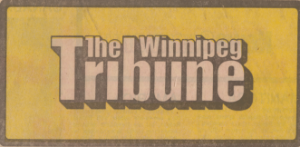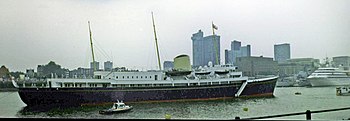 |
| Art Deco former Daily Express building, Fleet Street, London (Photo credit: Wikipedia) |
 |
| Winnipeg Tribune (Photo credit: Wikipedia) |
 |
| Royal Yacht Britannia, The Thames, London (Photo credit: Wikipedia) |
 |
| Front page of the Daily Express, one of Northern & Shell's publications. (Photo credit: Wikipedia) |
According to Richard Gizbert, a graduate of Ottawa’s Algonquin College, who every weekend runs a programme on press
performance on AlJazeera, (the Arab world’s TV network), journalists are finally getting the message
that it doesn't matter a damn if you are first with the news or not.
This new movement is known as “slow journalism”, and the idea is that the content of your story
counts more than the rapidity with which you can turn it in.
Well, I don’t want to sound like an “I told you so” kind
of chap, but I worked in daily journalism from 1945 until 1971, and have worked
on and off in it at least until the late 1990s, and I never made any secret of
my contempt for the idea that I was supposed to get the story before the guys
on the opposition newspaper. This being so, I can hardly regard Gizbert’s
revelations as being in the nature of rocket science, as one might say. One
sees this kind of thing fairly regularly, where some eager researcher will
investigate a subject in detail, and come up with conclusions that, as my late
wife always said, “even my grandmother would have known.”
Personally, I have never ever seen any advantage of any
serious sort accruing to any person or newspaper which got the story first. But
on the other side there have been many occasions on which this haste to publish
has directly affected the public welfare, notably on a US presidential election
in which it was revealed by a later inquiry that the haste for maximum speed
had been responsible for various television channels broadcasting incorrect
results.
Of course, I do remember many of the very amusing, not to
say ludicrous, occasions on which practitioners of this high pressure sort of
journalism scored their great (but essentially meaningless) victories. I was on the periphery in the 1950s of a great battle
between the Winnipeg Free Press and
the Winnipeg Tribune, when Marilyn
Bell was swimming across one or other of the Manitoba lakes. I watched as some
senior journalists tied themselves in knots to fool their opponents into
thinking they were lagging behind, so as to catch them off their guard. I
thought the whole thing pointless, and in the end, of course, neither newspaper
won the race: both covered the news.
Later on I watched the Toronto newspapers rush to be first
with the news that the Queen had almost slipped while going up or down a ramp
on to the Royal yacht Britannia. And still later, on the same Royal tour of
Canada I observed two denizens (I use
this wornout cliché advisedly) of Fleet street, sit by the bar of the Royal
train carrying the Queen and her consort across the country, never moving to
actually cover an event, but merely watching and waiting for some silly mistake
by a harassed official that they might elevate into a front-page news story.
This is not quite the same thing as the haste-before-all brigade, but it arises
from the same impetus, that is, to get a story that no one else has (or is
likely to have, for that matter). I was astounded, and, I have to admit,
amused, as one of these, a man employed
as a columnist for London’s Daily Mail
at the time, seized on the Queen’s having missed one engagement to launch an attack
on “the bumbling officials and ambitious
Prime Minister (Diefenbaker)” who he
alleged were making a victim of the Queen and her good health (than what could be lower?). Immediately from the London office came congratulatory
telegrams (“heartiest congratulations your great front-pager”). Since the
ambitious, but innocent Prime Minister, unaccustomed to handling this kind of
journalism, rose in the House of Commons the next day to deny the report, he
gave rise to a second front-pager by our correspondent beside the bar of the
Royal train, making him look even sillier, followed by another warm telegram of
congratulation.
All this was such a challenge to the correspondent (a boy
educated in the best public schools, needless to say), of the Daily Express, a Beaverbrook newspaper
known for its scant regard for the facts, that he announced his own exclusive
the next day, also a front-page story, that, before the Queen visited the
Woodbine racetrack in Toronto, the stalls containing the horses had been
sprayed with perfume. “Great story, Tom, front-pager! Keep it up!”
This is amazing and ludicrous stuff, but it actually
happened, I can swear to that.
I may have been a little unusual in the confederation of
journalists, but I always found myself in revolt against some of the more
appalling imperatives of the craft, such as, when someone has been killed in an
accident, or, worse still, a murder, one was forced to go into the family’s
home and demand if they could find a picture of their dead relative (for the
delectation of the toiling masses!). I
shrank from that. As I also shrank from recording a tragedy I was called on to
cover once in that unproductive farmland in soggy ground south of Lake
Winnipeg, when a failing farmer went into his barn one morning and in a fit of
desperation shot his teenage son, then shot himself. This seemed to me to be
the sort of thing that no one else could profit much from knowing about, and I
would rather not have reported it at all. My solution to that personal dilemma
was to write up all the relevant facts, however libellous they might have been
to neighbours, safe in the (incorrect) assumption that the office would see fit not to publish them. When they
appeared in the paper --- my strategy to keep them out having failed --- we had
to publish some sort of apology the next day.
I can say without, I believe, fear of contradiction, that
my most productive years as a journalist were those when, alone in our London,
England office, I could confront some subject of interest and importance, take
a few days to research it, and then hand in some copy which, I hoped, might enlarge
readers’ interests and understanding.
Or later on, in those years of the late 1960s, when, by
this time given a great deal of freedom in The
Montreal Star to practise this recently-discovered entity now called “slow
journalism”, I wandered the country, from one province to the other, one native
community to another, talking to people who never saw a journalist before, but
had valuable things to impart so long as you were asking them about things of
essential interest to them. Time didn’t come into this sort of journalism: it
just didn’t count.
And for my money, time still doesn’t count, and I am glad
some journalists are at last coming to recognize the fact.
No comments:
Post a Comment